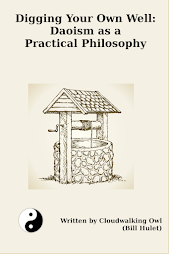 |
| E. O. Wilson, by Ragesoss, from Wiki Commons |
As I understand it, eusocial insects manage their relatively simple societies through the use of biological clues, such as the scent trails that ants use to mark paths to food sources. Human beings use something far more complex: culture. We have language, teaching, literature, and so on to create and transmit complex ideas from generation to generation, and this allows us to create increasingly complex societies.
Indeed, as I look at my life, I see it increasingly as simply a fragment of a eusocial whole that's only real "purpose" is the creation and transmission of that culture. In a way, I see human beings as being individual parts of a giant thinking machine---or organism---that is the consciousness of the planet (or universe.)
A question suddenly occurred to me yesterday: "If this is so, where do the religious traditions fit into this worldview?" Obviously, they are important parts of culture. But the more I think about them, it occurs to me that with only minimal violence to the way they view themselves, they fit quite nicely into my understanding of eusociality. Consider the three religions of China: Confucianism, Daoism, and, Buddhism. Each has some sort of key concept that I believe fits neatly into this idea of culture being central to the human experience.
Confucianism has "li", which is often translated as "ritual", this governs the relationship between people within society. As the Wikipedia describes it,
The rites of li are not rites in the Western conception of religious custom. Rather, li embodies the entire spectrum of interaction with humans, nature, and even material objects. Confucius includes in his discussions of li such diverse topics as learning, tea drinking, titles, mourning, and governance. Xunzi cites "songs and laughter, weeping and lamentation...rice and millet, fish and meat...the wearing of ceremonial caps, embroidered robes, and patterned silks, or of fasting clothes and mourning clothes...unspacious rooms and very nonsecluded halls, hard mats, seats and flooring"[2] as vital parts of the fabric of li.
Daoism has "Dao", which is something like a "natural law", but which applies to both human society as well as nature.
The word "Tao" (道) has a variety of meanings in both ancient and modern Chinese language. Aside from its purely prosaic use to mean road, channel, path, principle, or similar,[1] the word has acquired a variety of differing and often confusing metaphorical, philosophical and religious uses. In most belief systems, the word is used symbolically in its sense of 'way' as the 'right' or 'proper' way of existence, or in the context of ongoing practices of attainment or of the full coming into being, or the state of enlightenment or spiritual perfection that is the outcome of such practices. (Wikipedia)
And Buddhism (as well as other Indian religions) has "dharma", which has resonances of both religious teaching and natural law at the same time.
In Hinduism, dharma signifies behaviours that are considered to be in accord with rta, the order that makes life and universe possible,[10][note 1] and includes duties, rights, laws, conduct, virtues and ‘‘right way of living’’.[7] In Buddhism dharma means "cosmic law and order",[10] but is also applied to the teachings of the Buddha.[10] In Buddhist philosophy, dhamma/dharma is also the term for "phenomena".[11][note 2] Dharma in Jainism refers to the teachings of tirthankara (Jina)[10] and the body of doctrine pertaining to the purification and moral transformation of human beings. For Sikhs, the word dharm means the path of righteousness and proper religious practice. (Wikipedia)
Buddhism goes a little further than these other religions, though, by suggesting the doctrine of "turning the wheel of dharma". That is the idea that dharma isn't eternal or immutable, but rather that it progresses and changes as humanity becomes more complex and increasingly capable of comprehending more subtle understanding. To my feeble understanding, this would explain the changes as Buddhism started with Theravada, moved on to Mahayana, and, from that to Vajrayana systems.
Daoism doesn't go into such detail, it just suggests that it is impossible to "pin down" what the Dao is, and suggests that it is constantly changing and can't be exhaustively expressed. This lacks the suggestion of gradual progress that is implied in the Buddhist idea of "turning the wheel of dharma", but this distinction need not be evidence of an irreconcilable difference. Progress can be part of humanity without being an inevitable law of nature. Setbacks can occur in each system, as could an unforeseen "slate wiper"---like an asteroid hit that would exterminate the human race. But all religions were created before the concept of extinction became part of the human vernacular, so they can be excused for missing this point.
&&&&
I find all of this personally quite satisfying. I've pretty much absorbed the idea of anatta, or that the human ego has no real existence and is instead a fiction created by misunderstandings about the nature of consciousness. If I really never have existed as a continuous entity except as a product of the imagination---my past being a fiction and the future anticipation---then why should I be concerned about personal extinction? And yet, I get up in the morning and find purpose in life, as a creator and bearer of culture. I write this blog and another besides. I write books that almost no one wants to purchase or read. I am an avid participant in discussions between like-minded people on social media. I talk to friends and, when I can find the time, try to participate in politics. I don't know why I care about the future of the human race or what it thinks---it is just as much a product of the imagination as my own personal ego---but I do. I suspect that that is a biological drive or instinct, much like the scent trail that the ants follow on my kitchen counter top towards some spilled sugar.







No comments:
Post a Comment